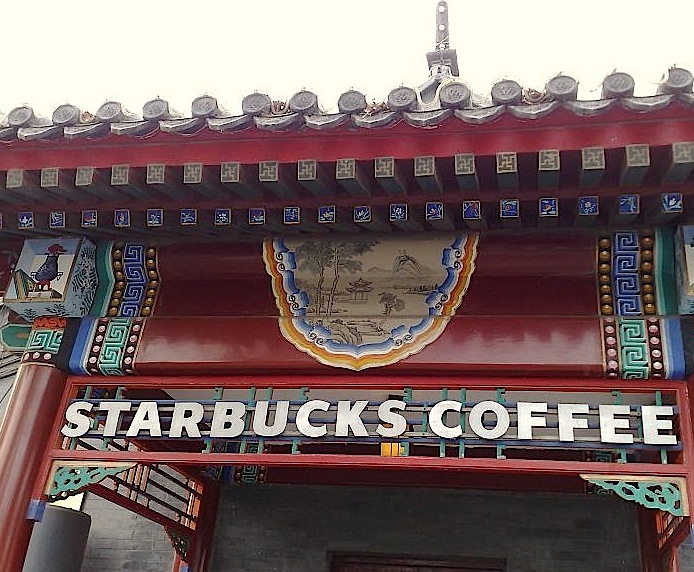
Though it can’t hold a candle to Chinese tea
“A latte please,” I said, grabbing a National Geographic and taking my usual bench by a sunny window in my university’s new student-run cafe. The cafe, opened in September, was the dream of Yang Yachun, its manager, an international business major. She saw a huge market in students seeking to experience Western culture through drinking coffee.
When my grandfather drank coffee for the first time 15 years ago, he said, “It tastes like something burnt. It’s good, though.”
He was an ordinary Chinese who’d spent his life doing carpentry in the northeast. He couldn’t have imagined our student cafe. Since China opened its gates to the world, a dazzling diversity has unfolded, with food our first fascination. When I was 10, in 2000, Pizza Hut arrived in my Beijing neighborhood, and you couldn’t get a seat. Starbucks arrived about then, and now China, home of tea, is Starbucks’ largest overseas market, with 400 outlets.
I’m not sure I enjoy coffee’s bitter flavor. Like most Chinese, I still prefer Chinese tea, especially Xihu Longjing, a roasted green tea grown in the eastern Zhejiang province, near Shanghai.
Every spring, a family friend there mails us fresh tea, since my father doesn’t think the Longjing sold elsewhere is authentic. I developed the habit of drinking tea every morning as a teenager. I enjoy tea’s fragrance and faint bitterness, and it is healthy. Coffee entered my life only last year, when I lived in New Zealand.
But it’s not just the drink. The rise of the cafe, its cultural atmosphere and reasonable prices, are attracting young people like me.
My latte came, served by a freshman boy in blue jeans and black shirt. I inhaled the fragrance and opened my laptop to write a paper. The manager, Yang, buys from the Italian brand Illy, so she decorated the cafe, called Danglu (youth), in Italian style. Yang’s entrepreneurial capitalist spirit is as fashionable here as her coffee; her establishment employs 14 students.
Observing Danglu, it’s easy to see why the Chinese government is escalating a war to beat back popular Western films, books, and TV shows. On Danglu’s shelf are donated Western books: The Unbearable Lightness of Being, The Great Gatsby, and a Chinese-American writer’s travelogue of America.
“China needs to strengthen its cultural production to defend against the West’s assault on the country’s culture and ideology,” an article in the Party magazine Seeking Truth argued recently. It’s also a priority announced by the People’s Congress.
That authorities want to win back our attention, and to position Chinese culture to gain global cultural influence. They’re establishing overseas government-sponsored language and culture schools called Confucius Institutes, and news bureaus worldwide.
But what about tea? Why not promote teahouses, if the goal is to boost our culture, here and abroad?
The Chinese teahouse, 1,600 years old, was for travelers to rest, and later was a gathering place for chatting and watching performances. A famous 1957 play, “Teahouse,” by Lao She, shows the changes that remade China in the 20th century — the collapse of a dynasty, Republican and Communist Revolutions — via conversations in a Beijing teahouse.
Fancy teahouses serving dessert can still be found in big cities’ central business districts. But prices are up to 10 times higher than Starbucks’. Patrons there are mostly wealthy business people or important government officials, not students like me.
It’s disturbing to see my generation getting lost as we pursue Western culture. This past November, when the first Starbucks opened in Zhengzhou, a large city in Central China’s Henan province, coffee mania turned into a blind cult. Young people waited outside for hours, and flooded social media with their uploaded pictures.
In my foreign studies university, we’re failing to keep alive what makes us Chinese. We’re focusing on foreign languages, but letting our Chinese writing skills decline. And we’re leaving home. In just one year (2010), Chinese student attendance in American colleges rose by 30%, according to the Institution of International Education. I’m guilty myself — I’m leaving this fall to study for a U.S. master’s degree.
Worldliness isn’t bad, but we need to find a balance in our search for identity. We can start with Chinese tea.
Jennifer Ning Xiaoning, a Beijing native, studies journalism at Beijing Foreign Studies University.
What's your view?
You must be logged in to post a comment.




